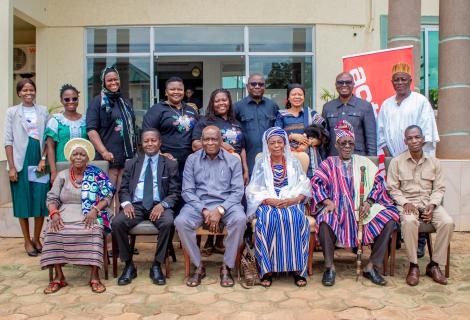ActionAid Ghana hosts 57 teenage mothers and child marriage survivors for the Upper West Regional Multi-Stakeholder Conference on Child Marriage

Dubbed “Addressing the root causes of girl-child marriage: the role of stakeholders," The conference sought to take up a collective mission to protect the rights and futures of girls across the Upper West region while tackling a pressing issue affecting our communities in Ghana and millions of girls globally.
Child marriage is a violation of human rights that robs young girls of their childhood, education, and prospects, and it is an issue that requires immediate and sustained action. It perpetuates the cycle of poverty and undermines our efforts towards gender equality and sustainable development. Globally, an estimated 12 million girls are married before the age of 18 every year. If we do not intensify our efforts, more than 120 million girls will marry by the end of this decade, most of them in Sub-Saharan Africa, including Ghana.
The 2021 Ghana Population and Housing Census reveals that about 19% of girls in Ghana are married before age 18. In the Upper West Region, the situation is even more alarming, with child marriage rates reaching approximately 36%, as highlighted by UNICEF Ghana. These figures are not merely statistics; they represent the lives of young girls whose potential is being cut short, whose education is being disrupted, and whose health and well-being are at risk. These young girls deserve the right to education, health, and empowerment.
ActionAid’s commitment to ending child marriage is part of a broader global agenda—the United Nations Sustainable Development Goals (SDGs). Specifically, SDG 5—Achieving Gender Equality and Empowering All Women and Girls—targets the elimination of all harmful practices, including child marriage, by 2030. This global commitment serves as a potent reminder that our work here in Ghana is part of a worldwide effort to ensure that every girl, regardless of where she is born, has the opportunity to live a life free from violence and discrimination.
ActionAid Ghana is deeply committed to combating child marriage and supporting the most vulnerable girls. AAG’s operation in this area is comprehensive, recognising that child marriage requires a multifaceted response. With a range of initiatives aimed at combating child marriage and empowering girls, AAG rescued at-risk girls, supported teenage mothers, and established Girls' Empowerment and Advocacy Platforms nationwide. The EAP platforms provide safe spaces for girls to learn about their rights, build confidence, and advocate for change.
Additionally, ActionAid Ghana has trained Community-Based Anti-Violence Teams (COMBATs) to identify and respond to cases of violence, including child marriage, at the community level. To further support young people, a booklet titled "The ABCs of Reproductive Health: Random Questions High Schoolers Ask," designed to provide accurate, age-appropriate information on reproductive health, has also been produced.
However, as a social justice organisation, our work would not be complete without acknowledging the significant progress made within Ghana's legal framework to protect the rights of women and girls. The Children's Act of 1998 and the Domestic Violence Act of 2007 provide a solid foundation for safeguarding children and women. More recently, the passage of the Affirmative Action Bill marked a critical milestone in a collective effort to promote gender equality and protect the rights of women and girls. This Gender Equity Bill, once assented to by the president, will strengthen our resolve to end harmful practices like child marriage and further our commitment to ensuring that women and girls have equal opportunities to thrive.
The global community has learnt that the fight against child marriage requires a holistic approach that is comprehensive and multi-stakeholder, aligning with SDG 17 and emphasising the importance of partnerships in achieving sustainable development. AAG calls on institutions and like-minded organisations to work together and share resources, knowledge, and strategies by prioritising these three key areas:
1. Strengthening Educational Programs: We must invest in educational initiatives that empower girls with the necessary knowledge and skills. Integrating comprehensive sexuality education into school curricula is crucial.
2. Community Mobilisation: We must engage with traditional and religious leaders, community elders, and parents to challenge harmful norms and practices. We must also engage with our communities, listen to their concerns, and involve them in designing and implementing interventions. We can create lasting change by promoting positive role models and fostering dialogue.
3. Advocacy for Stronger Policies and Enforcement: While the passage of the Affirmative Action Bill is a significant step forward, we must also ensure that existing laws against child marriage are fully implemented and enforced. This includes advocating for policies that support girls' education and empowerment and addressing the root causes of child marriage, such as poverty and gender inequality, through comprehensive social protection measures.
Speaking at the conference, John Nkaw, the Country Director, asserted that the fight against child marriage is not just a fight for the future of individual girls in the Upper West; it is a fight for the future of our nation. It is a fight to ensure that the goals enshrined in the SDGs and the Affirmative Action Bill are realised for every girl in Ghana. By working together, we can create a society where child marriage is a relic of the past, where every girl is educated, empowered, and free to shape her destiny.”.
Reaffirming ActionAid Ghana's commitment to this cause, John Nkaw also disclosed AAG’s readiness to support the government, civil society, communities, and most importantly, the girls themselves in the fight to end child marriage.
End.